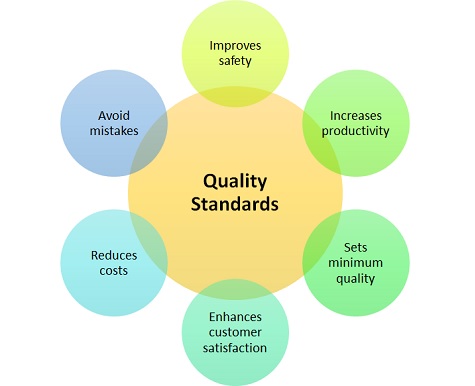- Business Concepts ›
- Operations and Supply Chain ›
- Quality Standards
Quality Standards
Definition, Importance & Example
This article covers meaning & overview of Quality Standards from operations perspective.
What is meant by Quality Standards?
A quality standard is a detail of the requirements, specifications, the various guidelines and characteristics to be able to meet its quality by the product in order to meet the purpose of the product, process or the service. ISO international standards are the most widely accepted set of quality standards adopted by majority of firms across countries. In case if a company fails to meet its quality standards, it may end up losing the trust of the customer and henceforth its market share.
Importance of Quality Standards
A product is said to be of quality if it is free from any manufacturing defect deficiency or significant variation. In order to do so certain specific standards need to be set so that uniformity is achieved in the entire set of products being manufactured. The quality standards defined should be such that the features and specifications offered by the product should be capable to meet the implied need of the product.

Advantages of Quality Standards
Advantages of having quality standards in a manufacturing company are:
1. It helps save costs & improves productivity.
2. Increases customer satisfaction with high quality products & services.
3. Sets minimums standards of quality for processes, products & services.
4. Maintaining quality standards increases safety of workers.
5. Good communication enables smooth flow of operations & avoid mistake repetition.
Example
For example say a car manufacturer found some major issue with its car and calls for a product recall, by doing so it can lose its long built brand equity. By investing in quality one can cut down on huge loses and win a satisfied customer base. The basic accuracy & minimum quality in the engine, design, performance etc are governed by quality standards for automobile companies.
Hence, this concludes the definition of Quality Standards along with its overview.
This article has been researched & authored by the Business Concepts Team which comprises of MBA students, management professionals, and industry experts. It has been reviewed & published by the MBA Skool Team. The content on MBA Skool has been created for educational & academic purpose only.
Browse the definition and meaning of more similar terms. The Management Dictionary covers over 1800 business concepts from 5 categories.
Continue Reading:
What is MBA Skool?About Us
MBA Skool is a Knowledge Resource for Management Students, Aspirants & Professionals.
Business Courses
Quizzes & Skills
Quizzes test your expertise in business and Skill tests evaluate your management traits
Related Content
All Business Sections
Write for Us